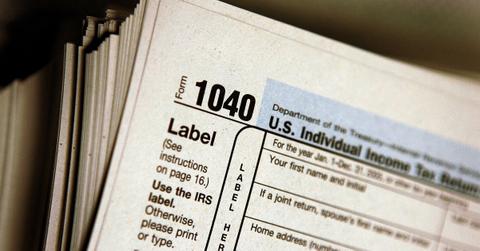Are Taxes Going Up in 2022? That Depends on a Few Factors
The cost of everything has gone up recently due to rising inflation. As we enter tax season, you might be wondering if taxes are going up in 2022.
Jan. 13 2022, Published 1:25 p.m. ET

The cost of everything from gasoline to hamburgers has gone up recently due to rising inflation. As we enter tax season, you might be wondering if taxes are going up in 2022.
The IRS increased the income tax brackets for 2022.
Some people will see an increase in taxes, while others might not. In November, the IRS increased the federal income tax brackets and standard deductions for 2022. That means if you make the same salary, you might be in a lower tax bracket in 2022.

For example, if you are a single taxpayer who makes $41,000 per year, you were in the 22 percent tax bracket for 2021. However, for 2022 if you make the same salary, your income now falls in the 12 percent tax bracket. So, you’ll pay fewer taxes.
Here are the 2022 tax brackets.
For individual single taxpayers:
| Income | Tax Bracket |
|---|---|
| up to $10,275 | 10% |
| $10,276 to $41,775 | 12% |
| $41,776 to $89,075 | 22% |
| $89,076 to $170,050 | 24% |
| $170,051 to $215,950 | 32% |
| $215,951 to $539,900 | 35% |
| over $539,900 | 37% |
For married couples filing jointly:
| Income | Tax Bracket |
|---|---|
| up to $20,550 | 10% |
| $20,551 to $83,550 | 12% |
| $83,551 to $178,150 | 22% |
| $178,151 to $340,100 | 24% |
| $340,101 to $431,900 | 32% |
| $431,901 to $647,850 | 35% |
| over $647,850 | 37% |
These increases apply to tax returns filed in 2023 for the 2022 tax year, so if you’re expecting them on the tax return this year, you’re out of luck.
The IRS also raised the standard deductions for 2022 to $12,950 for single filers and $25,900 for married couples filing jointly.
Unchanged tax provisions might lead to higher taxes.
However, some tax provisions remained the same, which could lead to higher taxes down the road. Take capital gains taxes, for example. Although home prices have skyrocketed, the amount of profit home sellers can exclude from capital gains on their tax bills hasn’t changed since 1997.
Single filers can exclude up to $250,000, while couples can exclude up to $500,000 from the sale of their home. According to Statista, the average sales price of a new home in 2021 reached over $408,000.
Taxes on Social Security benefits also haven’t changed in decades. Up to 85 percent of benefits might be taxable if the adjusted gross income, levy-free interest, and one-half of Social Security benefits exceed $34,000 for single filers and $44,000 for married couples filing jointly, CNBC reports.
Taxes might increase for high earners.
High-income earners will also see their taxes go up due to unchanged thresholds on an investment income surcharge enacted by former President Barack Obama. The provision levies a 3.8 percent surcharge on single taxpayers with a modified adjusted gross income of $200,000 and above, while the threshold is $250,000 for couples.
Income tax bills vary by state.
Your tax bill might be higher in some states. According to the Tax Foundation, 21 states and the District of Columbia made significant tax changes in 2022. The District of Columbia was the only jurisdiction to increase income taxes, while five states (Arizona, Arkansas, Louisiana, North Carolina, and Oklahoma) cut income taxes.
